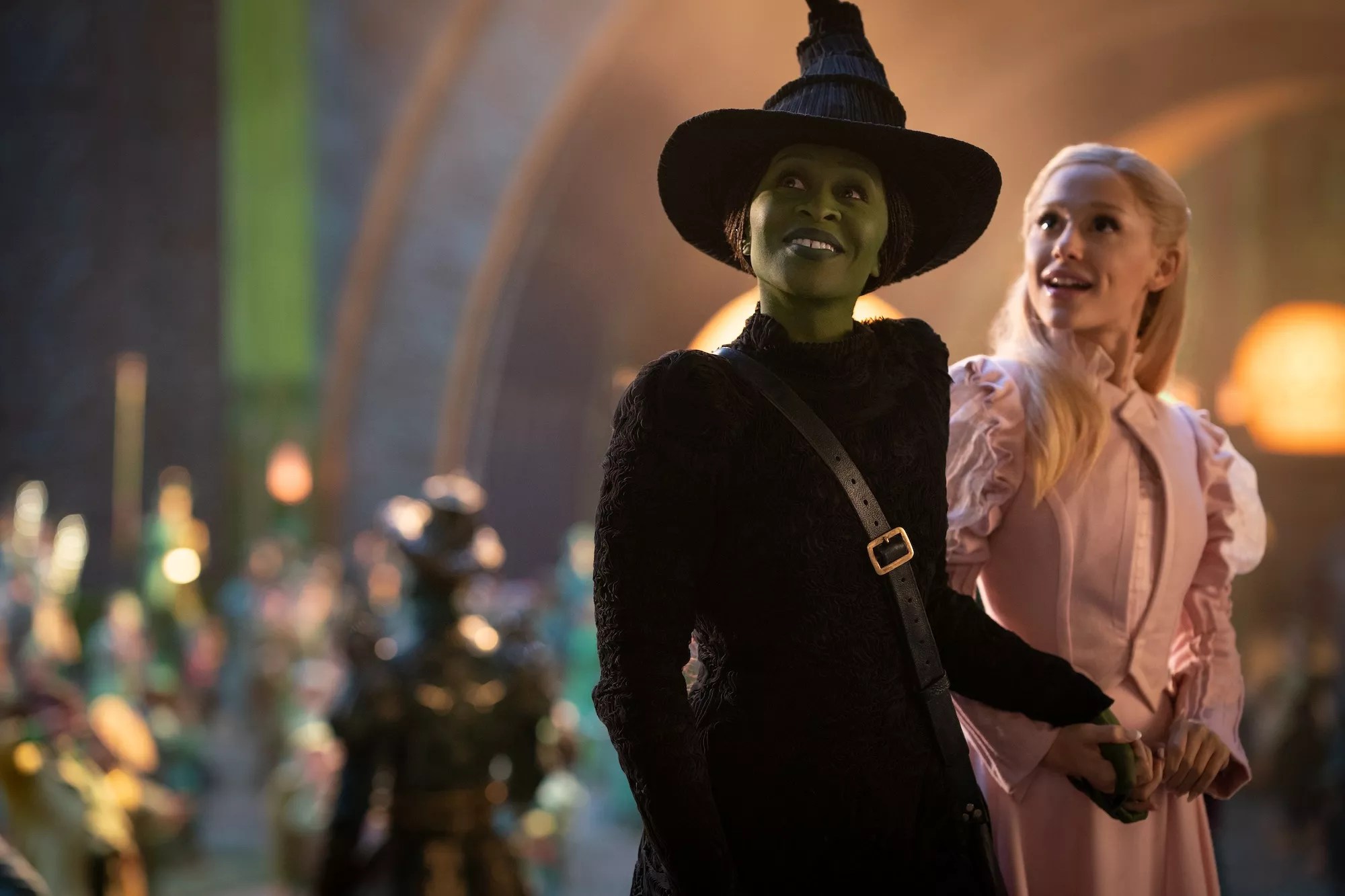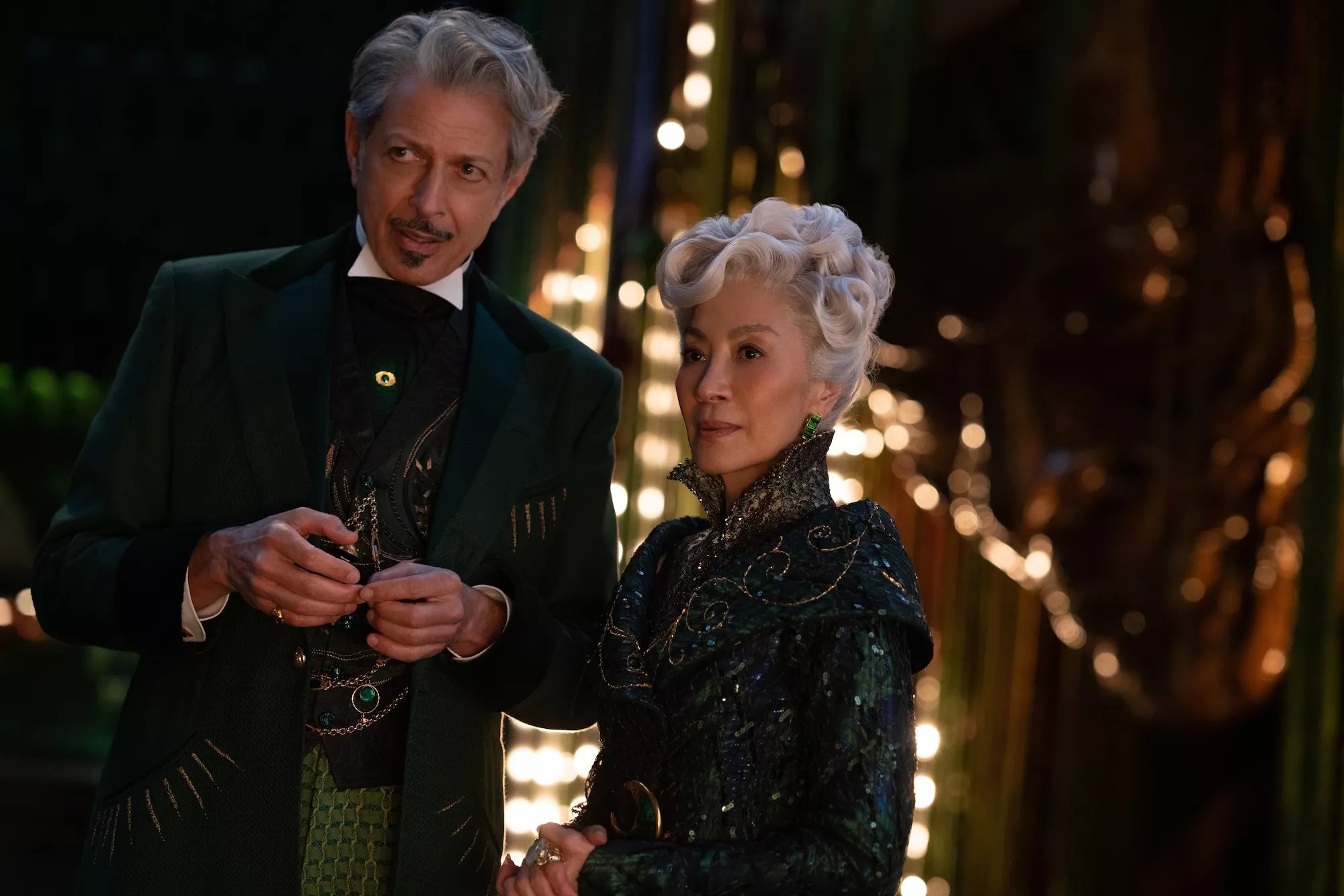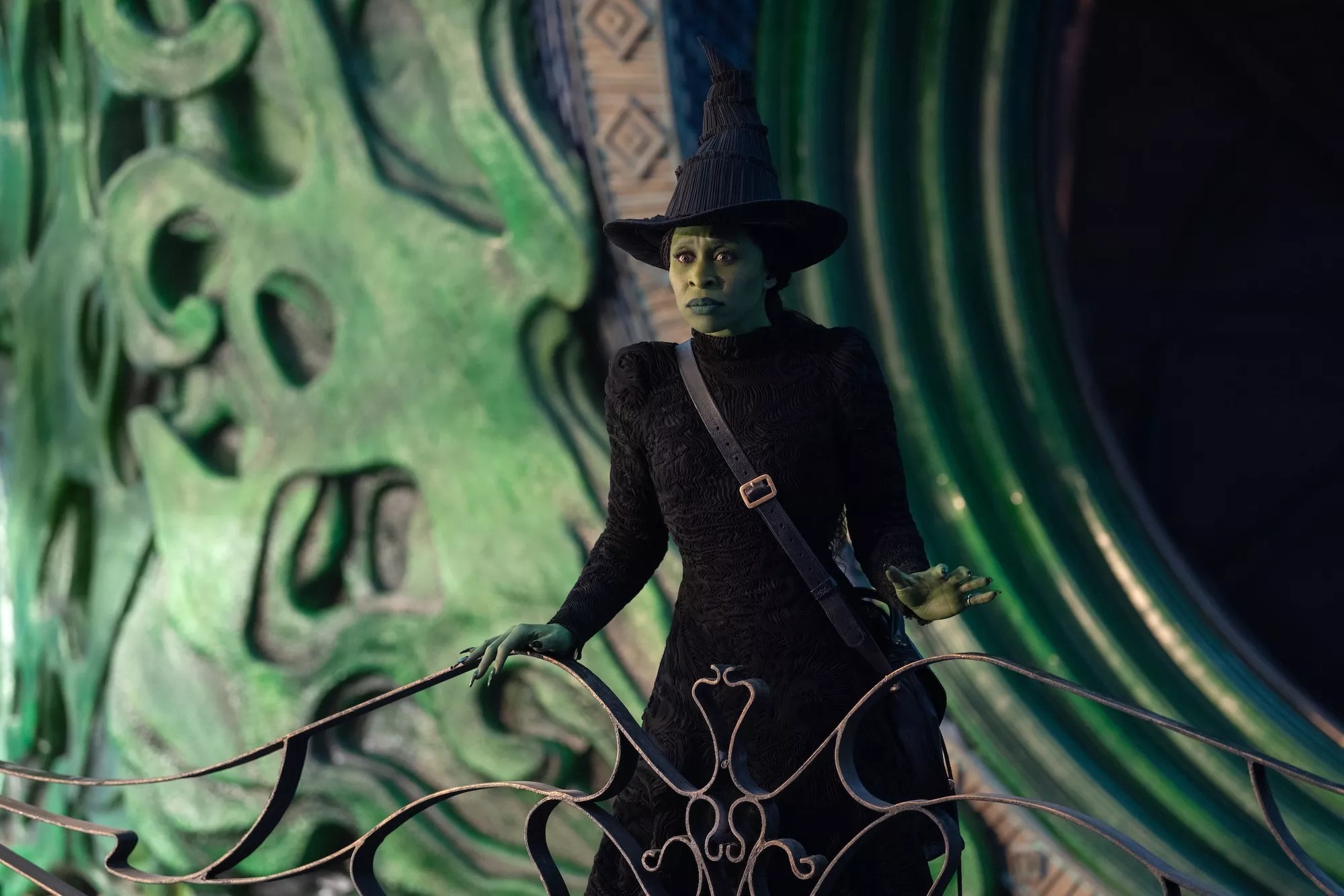
Photo by Giles Keyte/Universal Pictures

Audio By Carbonatix
One of the core questions in the opening number of Wicked, “No One Mourns the Wicked,” posed by none other than Glinda the Good, asks, “Are people born wicked, or do they have wickedness thrust upon them?” In watching the film adaptation of Wicked, the hit stage musical that has been running for 20 years straight, one must wonder if mediocrity is the only thing being thrust upon us these days.
On stage, that mediocrity was blessedly disguised by engaging songs, choreography, production design, and costuming, but on screen, when directed by a man with no vision other than empty showmanship, it becomes harder to ignore just how shallow a work Wicked is. Put simply, Wicked is a musical about how the Wicked Witch of the West from The Wizard of Oz came to be known as such a fiend. To call it derivative would be an understatement: Jon M. Chu’s film is an adaptation of Stephen Schwartz and Winnie Holzman’s stage musical, which itself is an adaptation of Gregory Maguire’s novel Wicked: The Life and Times of the Wicked Witch of the West, itself a revisionist adaptation of L. Frank Baum’s The Wonderful Wizard of Oz.
To call it glorified fan fiction wouldn’t be a stretch, but the thing that makes Wicked so frustrating is that it doesn’t even have the decency to be a complete film, billing itself as a “Part One” that only adapts the first act of the stage musical by doubling its length into that of the stage musical itself. This act follows Elphaba (The Wicked Witch), played by Cynthia Erivo, from her very conception and isolated childhood to her time at Shiz University and the moment when the entirety of Oz came to know her as a villain.
Much of what comes in this territory is just basic world-building and relationship setup, especially with characters like Glinda (The Good Witch), played by Ariana Grande, whose “friendship” with Elphaba is the work’s main draw. Others – from Fiyero and Nessarose to Doctor Dillamond and the Wizard himself – are certainly necessary figures in the tale being told, but Elphaba and Glinda are its heart and soul. It’s no surprise that the entire tale is essentially told through Glinda’s eyes as a flashback; she’s as essential as the Wicked Witch herself.
To the film’s credit, its two leads are often charming, even if nothing of note can be said about any other performer involved. (Some, like Jeff Goldblum and Michelle Yeoh, are outright bad.) Erivo is at her best when performing vulnerability instead of stoniness, with her greatest bits coming early in “The Wizard and I” as she imagines how life will change upon meeting someone who won’t judge her. Grande largely imitates the stage show’s original Glinda actress Kristen Chenoweth to great results and shows off what years of Nickelodeon sitcom training can do for someone’s physical comedy skills. Their more sincere beats together, rather than their bickering, make the performances work even when surrounded by such an empty film.

Jeff Goldblum and Michelle Yeoh in Wicked
Photo by Giles Keyte/Universal Pictures
To blame this on the source musical exclusively would be unfair, despite it already shaving off the edges of Maguire’s intriguing work – much like Hairspray‘s stage musical did with John Waters’ seminal film. If the stage musical itself had already largely stripped most of the novel’s darker elements – from Elphaba’s mother being date raped by a potion seller, which is turned into a jaunty dance by a cheating wife, or the dense attempts at exploring the sociopolitical climate of Oz, simply reduced to a confused slavery metaphor via animal cruelty on stage – the film somehow manages to dull any nuance in its storytelling further. For all the claims of “deepening” the lore and characterization that Wicked‘s filmmakers boast in their decision to split itself in two, nothing new in the film feels enlightening or necessary.
Various scenes of Elphaba being mistreated by family and strangers alike are included, as though the filmmakers felt the need to make the text’s metaphor of “otherness” even more thuddingly obvious. Other bits of padding include an origin story for why the yellow brick road is yellow, several flop jokes delivered by the annoying duo of Bronwyn James and Bowen Yang, and a secret meeting of CGI-talking animals that embarrassingly spells out that the real villain is actually fascism, in case you were too stupid to realize it from the other 40 times its stated.
So many decisions in Wicked seem to be made all for the sake of padding the runtime for the two-part split, even down to the musical arrangements themselves. A song like “Dancing Through Life,” itself already an extended one on stage, not only has a terrible pop groove instead of its traditional orchestration but becomes a 20-minute laborious set piece with more breaks and asides than can be imagined. “One Short Day,” one of the stage show’s most engaging and tightly designed numbers, is interrupted by a new song sung by Wicked original cast members Chenoweth and Idina Menzel, which is nothing more than an info dump about the history of the spell book known as The Grimmerie. There’s no reason for it to be there other than a glorified cameo for the two actresses (composer Stephen Schwartz gets one shortly after as well), but it destroys the flow of an already perfect number.
Regardless of the flaws inherent to the stage show – of which there are many glaring faults, though this critic still finds the show charming in some ways – there’s an undeniable quality to its staging and craftsmanship that is fairly irresistible. Though it could be assumed that director Jon M. Chu’s penchant for maximalism would serve a show like Wicked well, it’s hard to find anything that looks good here. Sure, the stages that were built and the choreography that is present all seem solid enough, but it’s all buried under terrible filmmaking. Most of its editing and shot composition is a nightmare that actively detracts from the production design and blocking at work, down to even Chu’s unique stylistic choices – like shooting bits of “What Is This Feeling?” in split screen – coming across as an eyesore instead of a thoughtful adaptation choice.

Cynthia Erivo in Wicked
Photo by Giles Keyte/Universal Pictures
Whenever Chu attempts to engage with artifice, it becomes all the more obvious just how ugly the film is. His go-to technique is to have the camera track characters through rooms lazily, something that has no visual flourish beyond literal movement. Colors that should be eye-popping in their attempts to emulate The Wizard of Oz‘s use of Technicolor are dulled by beige color grading and the decision to integrate far too many distracting special effects into every scene. Why bother creating these immense, beautiful sets if they’re going to be washed out because you’re trying too hard to have fake magical creatures and completely unreal backdrops blended in? While the Emerald City shines bright on stage because of that grand production design, here it just looks like a random set with far too many extras roaming about and dancing.
The place where Wicked‘s faults are most clear is during “Defying Gravity.” What was once the stage show’s show-stopping number that closed out the first act and left audiences wanting more is now an embodiment of everything wrong with the film. The number is marred by everything from terrible action spectacle as the flying monkeys chase the women to atrocious filmmaking, with the god-awful visual effects and choppy cuts making Elphaba look like she’s soaring through nothing but sludge. Even Erivo and Grande are barely lit well as they are pouring their hearts out in their last moments together.
All this is why Wicked – alongside Joker: Folie Á Deux and Emilia Pérez – serves as something of a signifier that the genre is dead if it cannot evolve or even serve as a complement to the works being adapted. The inventiveness and engagement with artifice from an original work like Annette and the care and beauty that went into adapting West Side Story for a contemporary audience feel as far off as the great musicals of decades past. Where Glinda and Elphaba sing of loathing when they find themselves at odds with one another, I can’t muster up enough hatred to get there with this film. I only find myself mourning, not just for Wicked but for every single audience member willing to settle for this.
Wicked. Starring Cynthia Erivo, Ariana Grande, Jonathan Bailey, Jeff Goldblum, and Michelle Yeoh. Directed by Jon M. Chu. Written by Winnie Holzman, Dana Fox, and Gregory Maguire. 160 minutes. Rated PG. Opens Friday, November 22; check for showtimes at miaminewtimes.com/miami/movietimes.